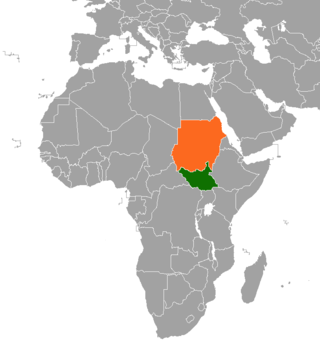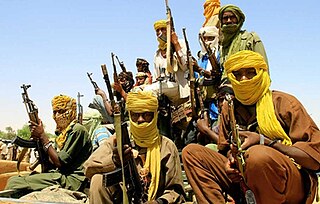| |||||
| Decades: | |||||
|---|---|---|---|---|---|
| See also: | Other events of 2014 History of Sudan | ||||
The following lists events that happened during 2014 in Sudan .
| |||||
| Decades: | |||||
|---|---|---|---|---|---|
| See also: | Other events of 2014 History of Sudan | ||||
The following lists events that happened during 2014 in Sudan .

Sudan, officially the Republic of the Sudan, is a country in Northeast Africa. It borders the Central African Republic to the southwest, Chad to the west, Libya to the northwest, Egypt to the north, the Red Sea to the east, Eritrea and Ethiopia to the southeast, and South Sudan to the south. Sudan has a population of 50 million people as of 2024 and occupies 1,886,068 square kilometres, making it Africa's third-largest country by area and the third-largest by area in the Arab League. It was the largest country by area in Africa and the Arab League until the secession of South Sudan in 2011; since then both titles have been held by Algeria. Sudan's capital and most populous city is Khartoum.

Apostasy is the formal disaffiliation from, abandonment of, or renunciation of a religion by a person. It can also be defined within the broader context of embracing an opinion that is contrary to one's previous religious beliefs. One who undertakes apostasy is known as an apostate. Undertaking apostasy is called apostatizing. The term apostasy is used by sociologists to mean the renunciation and criticism of, or opposition to, a person's former religion, in a technical sense, with no pejorative connotation.
Apostasy in Islam is commonly defined as the abandonment of Islam by a Muslim, in thought, word, or through deed. It includes not only explicit renunciations of the Islamic faith by converting to another religion or abandoning religion, but also blasphemy or heresy by those who consider themselves Muslims, through any action or utterance which implies unbelief, including those who deny a "fundamental tenet or creed" of Islam. An apostate from Islam is known as a murtadd (مرتدّ).

The War in Darfur, also nicknamed the Land Cruiser War, was a major armed conflict in the Darfur region of Sudan that began in February 2003 when the Sudan Liberation Movement (SLM) and the Justice and Equality Movement (JEM) rebel groups began fighting against the government of Sudan, which they accused of oppressing Darfur's non-Arab population. The government responded to attacks by carrying out a campaign of ethnic cleansing against Darfur's non-Arabs. This resulted in the death of hundreds of thousands of civilians and the indictment of Sudan's president, Omar al-Bashir, for genocide, war crimes, and crimes against humanity by the International Criminal Court.

In Islam, blasphemy is impious utterance or action concerning God, but is broader than in normal English usage, including not only the mocking or vilifying of attributes of Islam but denying any of the fundamental beliefs of the religion. Examples include denying that the Quran was divinely revealed, the Prophethood of one of the Islamic prophets, insulting an angel, or maintaining God had a son.

The Houthi insurgency, also known as the Houthi rebellion, the Sa'dah Wars, or the Sa'dah conflict, was a military rebellion pitting Zaidi Shia Houthis against the Yemeni military that began in Northern Yemen and has since escalated into a full-scale civil war. The conflict was sparked in 2004 by the government's attempt to arrest Hussein Badreddin al-Houthi, a Zaidi religious leader of the Houthis and a former parliamentarian on whose head the government had placed a $55,000 bounty.

Stoning, or lapidation, is a method of capital punishment where a group throws stones at a person until the subject dies from blunt trauma. It has been attested as a form of punishment for grave misdeeds since ancient times.

The persecution of Copts and discrimination against Coptic Orthodox Christians are historic and widespread issues in Egypt. Their treatment is indicative of the poor status of Christians in the Middle East more widely, despite the fact that the religion is native to the Middle East, and that Christianity in Egypt dates back to the Roman era. Copts are the indigenous Christians in Egypt, usually Oriental Orthodox, who currently make up 10% of the population—the largest religious minority of that country. Copts have cited instances of persecution throughout their history and Human Rights Watch has noted "growing religious intolerance" and sectarian violence against Coptic Christians in recent years, as well as a failure by the Egyptian government to effectively investigate properly and prosecute those responsible. However, as political violence is common many churches believe that the attacks against the church are not religious statements, instead political statements. Since 2011, hundreds of Egyptian Copts have been killed in sectarian clashes, and many homes, churches and businesses have been destroyed. In just one province (Minya), 77 cases of sectarian attacks on Copts between 2011 and 2016 have been documented by the Egyptian Initiative for Personal Rights. The abduction and disappearance of Coptic Christian women and girls also remains a serious ongoing problem.

Sudanese nomadic conflicts are non-state conflicts between rival nomadic tribes taking place in the territory of Sudan and, since 2011, South Sudan. Conflict between nomadic tribes in Sudan is common, with fights breaking out over scarce resources, including grazing land, cattle and drinking water. Some of the tribes involved in these clashes have been the Messiria, Maalia, Rizeigat and Bani Hussein Arabic tribes inhabiting Darfur and West Kordofan, and the Dinka, Nuer and Murle African ethnic groups inhabiting South Sudan. Conflicts have been fueled by other major wars taking place in the same regions, in particular the Second Sudanese Civil War, the War in Darfur and the Sudanese conflict in South Kordofan and Blue Nile.

The Sudanese conflict in South Kordofan and Blue Nile was an armed conflict and insurgency in the Sudanese states of South Kordofan and Blue Nile between the Sudanese Armed Forces (SAF) and the Sudan People's Liberation Movement–North (SPLM-N), a northern affiliate of the Sudan People's Liberation Movement (SPLM) in South Sudan. After some years of relative calm following the 2005 agreement which ended the second Sudanese civil war between the Sudanese government and SPLM rebels, fighting broke out again in the lead-up to South Sudan independence on 9 July 2011, starting in South Kordofan on 5 June and spreading to the neighboring Blue Nile state in September. SPLM-N, splitting from newly independent SPLM, took up arms against the inclusion of the two southern states in Sudan with no popular consultation and against the lack of democratic elections. The conflict is intertwined with the War in Darfur, since in November 2011 SPLM-N established a loose alliance with Darfuri rebels, called Sudan Revolutionary Front (SRF).
Ethnic violence in South Sudan has a long history among South Sudan's varied ethnic groups. South Sudan has 64 tribes with the largest being the Dinka, who constitute about 35% of the population and predominate in government. The second largest are the Nuers. Conflict is often aggravated among nomadic groups over the issue of cattle and grazing land and is part of the wider Sudanese nomadic conflicts.
Capital punishment is a legal penalty in the United Arab Emirates.

Protests against the 2013 Egyptian coup d'état erupted in July 2013. Immediately following the removal of President Mohamed Morsi by the Egyptian Armed Forces on 3 July 2013 amid demonstrations against Morsi's rule, many protesters amassed near the Rabia Al-Adawiya Mosque to call for Morsi's return to power and condemn the military, while others demonstrated in support of the military and interim government. Deadly clashes such as Rabaa massacre continued for several days, with three particularly bloody incidents being described by officials as "massacres" perpetrated by security forces. During the month of Ramadan, prime minister Hazem al-Beblawy threatened to disperse the ongoing Pro-Morsi sit-ins in Rabaa al-Adaweya square and al-Nahda square. The government crackdown of these protests occurred in a violent dispersal on 14 August 2013. In mid-August, the violence directed by the army towards the protesters escalated, with hundreds killed, and the government declaring a month-long nighttime curfew.

The South Sudanese Civil War was a multi-sided civil war in South Sudan fought from 2013 to 2020, between forces of the government and opposition forces. The Civil War caused rampant human rights abuses, including forced displacement, ethnic massacres, and killings of journalists by various parties. Since its end South Sudan has been governed by a coalition formed by leaders of the former warring factions, Salva Kiir Mayardit and Riek Machar. The country continues to recover from the war while experiencing ongoing and systemic ethnic violence.
Mariam [Meriam] Yahia Ibrahim Ishag or Maryam Yaḥyā Ibrahīm Isḥaq is a Sudanese religious freedom activist and public speaker. Meriam Ibrahim was arrested during her second pregnancy for apostasy and gave birth to a girl in prison on 27 May 2014. Mariam Ibrahim's case is part of a wider problem of persecution of Christians in Sudan.
The following lists events from 2014 in Egypt.
The following lists events that happened during 2015 in Egypt.

Mohamed Hamdan Dagalo, generally referred to mononymously as Hemedti, is a Sudanese military officer and the current head of the paramilitary Rapid Support Forces (RSF). A Janjaweed leader from the Rizeigat tribe in Darfur, he was the Deputy head of the Transitional Military Council (TMC) following the 2019 Sudanese coup d'état. Since 2013, Hemetti has commanded the RSF. He was considered by The Economist to be the most powerful person in Sudan as of early July 2019.

The situation for apostates from Islam varies markedly between Muslim-minority and Muslim-majority regions. In Muslim-minority countries, "any violence against those who abandon Islam is already illegal". But in some Muslim-majority countries, religious violence is "institutionalised", and "hundreds and thousands of closet apostates" live in fear of violence and are compelled to live lives of "extreme duplicity and mental stress."